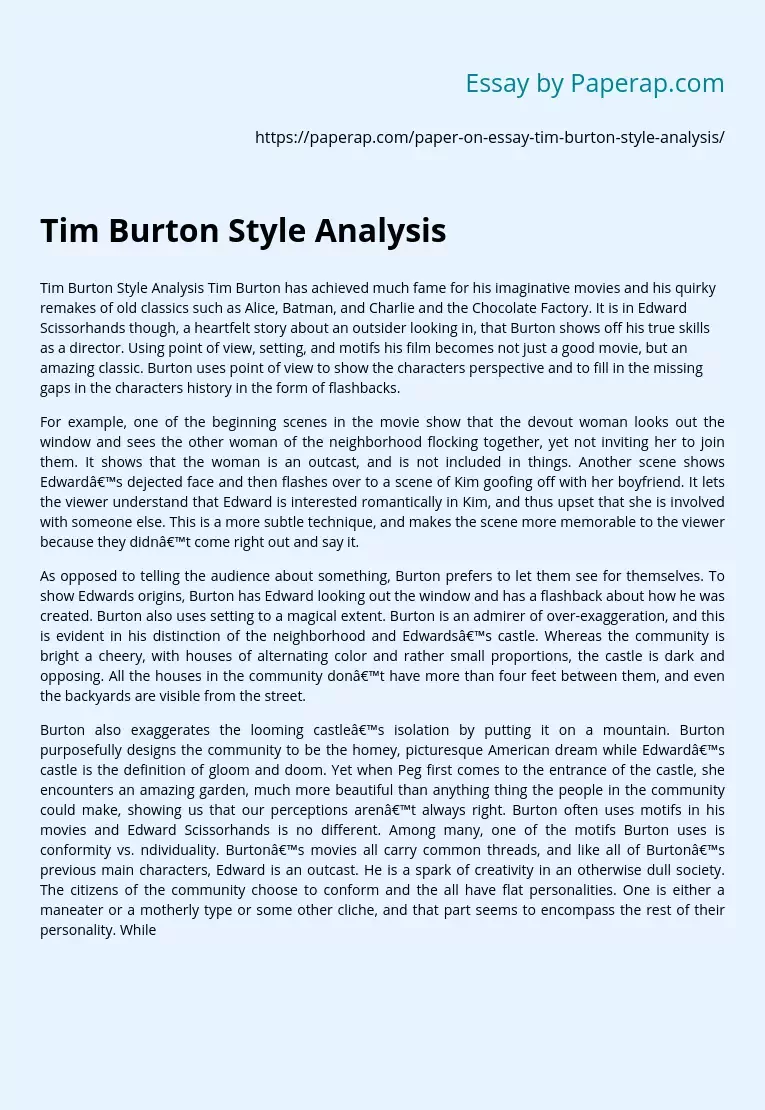Tim Burton Style Analysis
Tim Burton Style Analysis Tim Burton has achieved much fame for his imaginative movies and his quirky remakes of old classics such as Alice, Batman, and Charlie and the Chocolate Factory. It is in Edward Scissorhands though, a heartfelt story about an outsider looking in, that Burton shows off his true skills as a director. Using point of view, setting, and motifs his film becomes not just a good movie, but an amazing classic. Burton uses point of view to show the characters perspective and to fill in the missing gaps in the characters history in the form of flashbacks.
For example, one of the beginning scenes in the movie show that the devout woman looks out the window and sees the other woman of the neighborhood flocking together, yet not inviting her to join them. It shows that the woman is an outcast, and is not included in things. Another scene shows Edward’s dejected face and then flashes over to a scene of Kim goofing off with her boyfriend.
It lets the viewer understand that Edward is interested romantically in Kim, and thus upset that she is involved with someone else. This is a more subtle technique, and makes the scene more memorable to the viewer because they didn’t come right out and say it.
As opposed to telling the audience about something, Burton prefers to let them see for themselves. To show Edwards origins, Burton has Edward looking out the window and has a flashback about how he was created.
Burton also uses setting to a magical extent. Burton is an admirer of over-exaggeration, and this is evident in his distinction of the neighborhood and Edwards’s castle. Whereas the community is bright a cheery, with houses of alternating color and rather small proportions, the castle is dark and opposing. All the houses in the community don’t have more than four feet between them, and even the backyards are visible from the street.
Burton also exaggerates the looming castle’s isolation by putting it on a mountain. Burton purposefully designs the community to be the homey, picturesque American dream while Edward’s castle is the definition of gloom and doom. Yet when Peg first comes to the entrance of the castle, she encounters an amazing garden, much more beautiful than anything thing the people in the community could make, showing us that our perceptions aren’t always right. Burton often uses motifs in his movies and Edward Scissorhands is no different. Among many, one of the motifs Burton uses is conformity vs. ndividuality. Burton’s movies all carry common threads, and like all of Burton’s previous main characters, Edward is an outcast. He is a spark of creativity in an otherwise dull society. The citizens of the community choose to conform and the all have flat personalities. One is either a maneater or a motherly type or some other cliche, and that part seems to encompass the rest of their personality. While Edward, who is so different from the way he looks to the way he acts, seems to be the only human character. His personality possesses many layers.
The citizens also dress bright and cheery is a retro-style, while Edward with his uncontrollable hair and pale skin looks like a gritty Goth. In conclusion, Burton’s skill shines throughout the entire movie. Using point of view, setting, motifs, and other style techniques, Burton makes Edward Scissorhands a true hit. Tim Burton’s unorthodox style gives new standards to the movie business, and delivers heartwarming stories about misconceptions and finding yourself. With Tim Burton’s masterful skill and playful humor, it becomes obvious why Edward Scissorhands is such a hit. Gigi Orphali 12-8-11 p. 5-6
Tim Burton Style Analysis. (2019, Jun 20). Retrieved from https://paperap.com/paper-on-essay-tim-burton-style-analysis/

